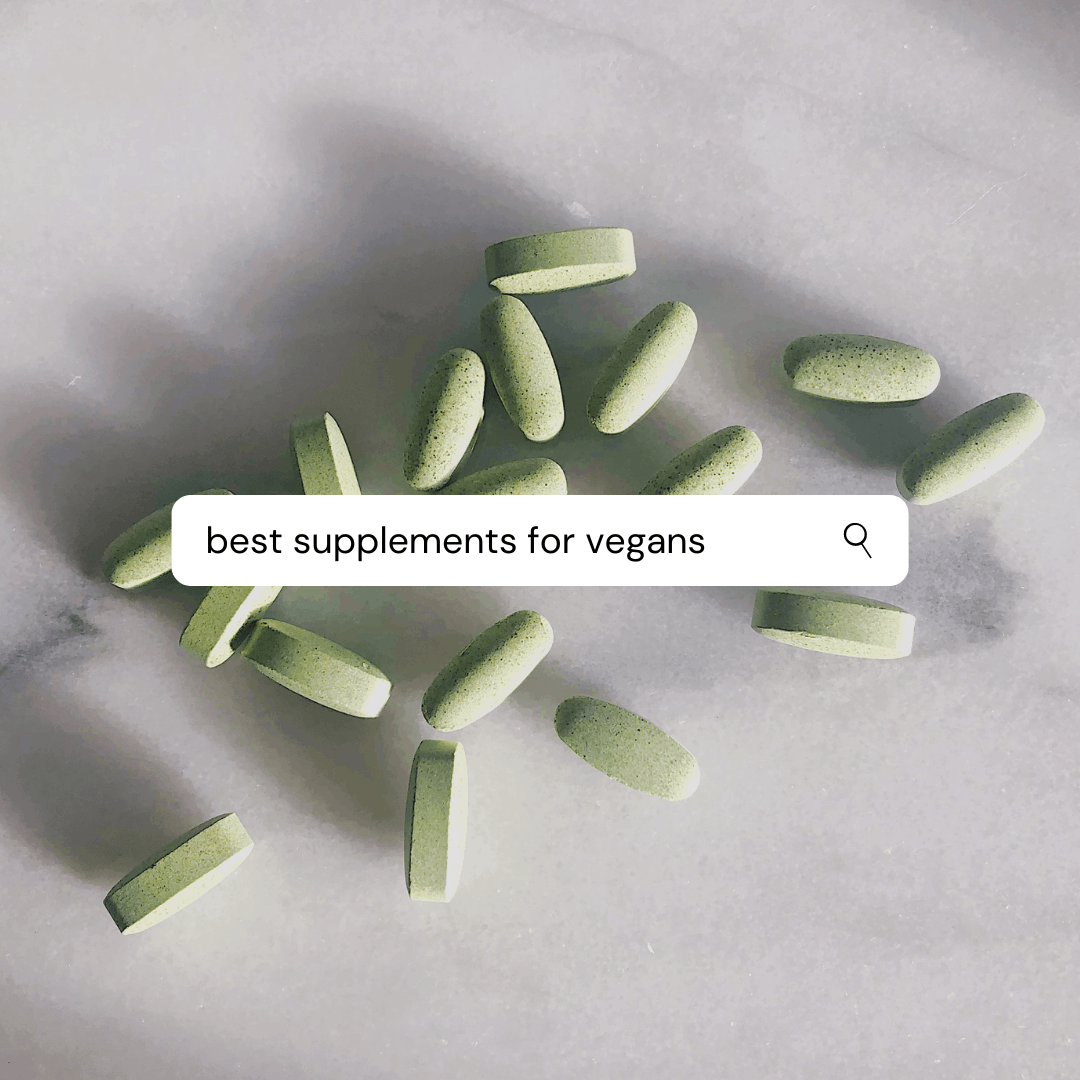Supplements for Vegans

Plant-based diets have amazing health benefits, including support of cardiovascular health.*[1] However, some nutrients may become deficient when following a vegetarian or vegan diet. These include vitamin D, vitamin B12, iron, calcium, zinc, omega-3 fatty acids, and often, protein. But, a vegan diet of conscience doesn’t need to cause nutrient deficiency!
Aside from sunshine, vitamin D is obtained through fatty fish, egg yolks, and fortified milk, [2] making it difficult to obtain for vegans and vegetarians, especially in the winter or early spring. As well, one serving of milk provides only 15% of daily value for Americans![3] So supplementation, regardless of following a plant-based diet or not, is often necessary. Historically, vitamin D supplements were only available from fish or lanolin sources, but vegan-friendly, lichen-sourced supplements are now available. Vitamin D is important because it contributes to healthy bone density, immunity, and overall well-being.*[4]
Vitamin B12 is another nutrient commonly deficient because it is only found in animal products, with the exception of nutritional yeast. Therefore, vegetarians and vegans may want to consider daily supplementation. Vitamin B12 is important for healthy red blood cells, which carry oxygen throughout the body ,and a deficiency can cause anemia, leading to fatigue, as well as cognitive issues.[5]
Iron is another nutrient of interest, found in both animal- and plant-based forms. Heme iron is from animal foods such as meat, poultry, and fish, while non-heme iron is found in plant foods.[6] Heme iron is more easily absorbed, while absorption of non-heme iron can be increased by taking it with vitamin C-rich foods, like kiwi, citrus, bell peppers, and broccoli.[7] Iron is necessary for healthy red blood cells, with iron deficiency being the most common form of anemia. Vegan-friendly ferrous bisglycinate or ferric pyrophosphate are two well-absorbed forms that don’t contribute to digestive discomfort, often caused by other poorly absorbed forms.
While calcium can be deficient in a vegan diet, many plant foods are rich in calcium. It is present in fortified tofu and plant milks, as well as dark green vegetables such as kale, broccoli, and bok choy.[8] The absorption of calcium depends on vitamin D levels, both of which contribute to strong bones. Algae-based calcium can also be supplemented if you can’t get enough through your diet.
Because few plant foods contain significant levels of zinc, a zinc supplement may be beneficial. While plant foods such as whole grains and legumes do contain zinc, they also contain phytic acid, which interferes with the mineral’s absorption. Soaking grains and legumes overnight can help increase the bioavailability of zinc, which is necessary for healthy immune function and DNA synthesis.*[9]
When people initially transition to a plant-based diet, it may take some time to incorporate more high-protein plant foods.[10] Plant-based foods that are high in protein include legumes, seeds, nuts, and tofu. Plant-based protein powders and bars, as well as fermented-protein options, which increase the bioavailability of nutrients, are often key to top up your daily requirements.
Omega-3 fatty acids support healthy inflammatory responses, but the forms our bodies use are typically only found in fatty fish [11] Plant-based omega-3s in nuts, seeds, and oils are poorly converted to the form we need, and these foods tend to have higher levels of omega-6 fatty acids. Supplementing with an omega-3 supplement from algae can provide the important EPA and DHA our bodies need.*
Vegetarian and vegan diets are extremely healthful. But becoming nutrient deficient is optional! Combining mindful food choices with strategic nutrient supplementation can help maintain optimal nutritional status.
References:
- Kim H, Caulfield LE, Garcia-Larsen V, et al. J Am Heart Assoc. 2019; 8(16):e012865.
- Linus Pauling Institute. Vitamin D. 2020. Available from: https://lpi.oregonstate.edu/mic/vitamins/vitamin-D#food-sources. Accessed December 13, 2020.
- National Institutes of Health. Vitamin D Fact Sheet for Health Professionals. 2020. Available from: https://ods.od.nih.gov/factsheets/VitaminD-HealthProfessional/
- Nair R, & Maseeh A. Vitamin D: The “Sunshine” Vitamin. J Pharmacol Pharmacother. 2012; 3(2) : 118-26.
- Moore E, Mander A, Ames D, et al. Cognitive impairment and vitamin B12: A review. Int. Psychogeriatr. 2012; 24(4): 541-56.
- Linus Pauling Institute. Iron. 2020. Available from: https://lpi.oregonstate.edu/mic/minerals/iron#food-sources. [Accessed December 13, 2020].
- Vitamin C. Linus Pauling Institute. Available from: https://lpi.oregonstate.edu/mic/vitamins/vitamin-C#food-sources. Published 2020. [Accessed December 13, 2020].
- Health Canada. Calcium – Canada.ca. 2020. Available from: https://www.canada.ca/en/health-canada/services/nutrients/calcium.html. [Accessed December 13, 2020].
- Zinc. Linus Pauling Institute. 2020. Available from: https://lpi.oregonstate.edu/mic/minerals/zinc. [Accessed December 13, 2020].
- Mariotti F, & Gardner CD. Dietary protein and amino acids in vegetarian diets-A review. Nutrients. 2019; 11(11):2661.
- Linus Pauling Institute. Essential Fatty Acids. 2020. Available from: https://lpi.oregonstate.edu/mic/other-nutrients/essential-fatty-acids#food-sources. [Accessed December 13, 2020].
.png)